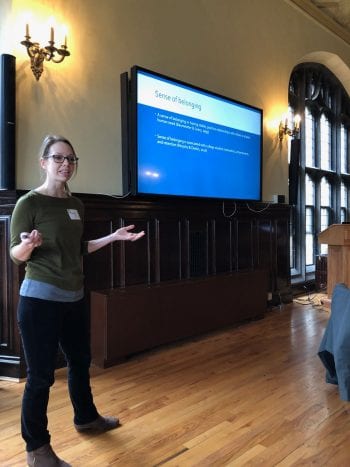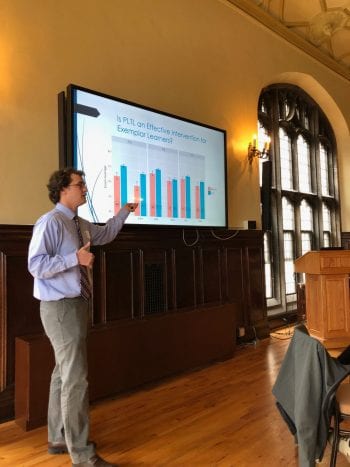This workshop presented data on two studies being conducted here at WashU in CIRCLE across various STEM disciplines. The two studies are summarized below and include links to references for more information:
- Sense of Belonging in Intro STEM: Who Struggles to Belong?
- Students’ Concept-Building Approaches and their Implications for Learning and Performance in STEM Courses

Sense of Belonging
Presented by Angela Fink
This data built upon the work presented in the August 2018 Teaching Academy to describe our Social Belonging Intervention and perhaps the predictability of outcomes (such as grades) in a course given a student’s sense of belonging or belonging uncertainty in a course at the beginning of the semester. The session also highlighted characteristics of students that described themselves as having low levels of belonging or high levels of uncertainty in STEM courses, and what steps instructors can take to support students’ sense of belonging.
Resources on Social Belonging:
- Psychology in Action- The Power of Social Belonging
- Walton and Cohen (2007): A Question of Belonging- Race, Social Fit and Achievement
- Walton and Cohen (2011): A Brief Social-Belonging Intervention Improves Academic and Health Outcomes of Minority Students
- Walton et al. (2015): Two Brief Interventions to Mitigate a “Chilly Climate” Transform Women’s Experience, Relationships and Achievement in Engineering

Concept-Building Strategies
Presented by Mike Cahill
This session focused on a more cognitive psychological study to understand how students approach learning new material. Specifically, we examined two different types of learners: exemplar and abstraction learners. Over the past several years, we have researched performance outcomes of both types of learners to see if certain types of learners have a better advantage in various STEM courses.
Resources on Concept-Building:
- McDaniel et al. (2014): Individual differences in learning and transfer: Stable tendencies for learning exemplars versus abstracting rules.
- Frey et al. (2017): Students’ concept-building approaches: A novel predictor of success in chemistry courses.
- McDaniel et al. (2018): Individuals differences in learning exemplars versus abstracting rules: Associations with exam performance in college science.

If you are a STEM faculty member here at WashU and are interested in participating in future CIRCLE Teaching Academy events, please contact Ali York at amyork@wustl.edu.